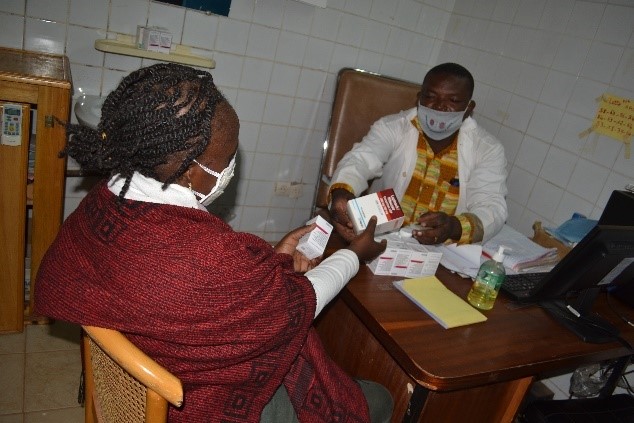Zakaria Zoungrana, Capacity Building Officer, #EAWA, FHI 360
Jean Paul Tchupo, Deputy Chief of Party, #EAWA, FHI 360
Marie Noelle Bellot, Consultant, #EAWA
Natasha Mack, Editor II, FHI 360

Aziz distributes antiretroviral therapy refills (Photo: #EAWA).
Chief nurse Abdoul Aziz Traoré sees the COVID-19 pandemic as a maze of unprecedented challenges for the work he enjoys most—making sure that people living with HIV (PLHIV) get the antiretroviral therapy (ART) they need without interruption.
Aziz, as he is known, is responsible for managing the stocks and distribution of antiretrovirals (ARVs) at the OASIS Medical Center in Burkina Faso’s capital city, Ouagadougou, for projects whose beneficiaries include people living with HIV (PLHIV). These projects include the Ending AIDS in West Africa (#EAWA) project funded by the U.S. Agency for International Development (USAID) through the U.S. President’s Emergency Plan for AIDS Relief (PEPFAR). #EAWA offers holistic assistance to sex workers, men who have sex with men, and PLHIV to improve access to prevention, care, and treatment services and accelerate progress toward ending the AIDS epidemic in West Africa by 2030.
In March 2020, when the government instated public measures such as a lockdown, curfew, and quarantines in an effort to curb the spread of COVID-19, Aziz’s most pressing worries regarded the effects the restrictions would have on PLHIV.
“We immediately pinned a notice on the door saying we were closed but that patients should call us at the designated telephone number. A colleague and I took the calls,” he said. “We also called a doctor at home and arranged telephone consultations as needed.
“Some of our clients wanted a COVID-19 test immediately, as they thought they were already infected. We took their requests seriously but found that reassuring them was usually enough to decrease their anxiety level. Of course, in case of doubt about a possible COVID-19 infection, we accompanied them to an appropriate health care site for testing.”
Aziz pinned safety regulations about COVID-19 on the door of OASIS that outlined the importance of washing hands regularly with soap and water, using hand sanitizers, and carefully maintaining social distance from other people. #EAWA also provided OASIS with water buckets and soap for hand washing, hand sanitizer, gloves, and sensitized the OASIS staff with precautionary measures and messages against the propagation of the COVID-19 virus.
Following those early actions, Aziz’s central challenge was to arrange for delivery of ART to regular patients and new ones, as needed. Because a failure or delay in dispensing ART could cause serious setbacks for patients, finding solutions was urgent.
“We could not allow vulnerable people to face new risks, especially in the COVID-19 environment,” he explained.
The solutions were to bring ART to the clients and to adopt multi-month dispensing (MMD). From April 13–June 22, 2020, 903 of 18,850 clients (4.79%) received their ARV refills in the community or at their homes (Figure 1). Couriers were arranged for home delivery of ART—with costs covered by #EAWA—and sometimes he made home visits personally to bring clients their ARVs. For PLHIV living outside of Ouagadougou, arrangements were made with transporters to carry packets of ARVs to their homes or to a nearby health care center.
“I enjoyed distributing medicines personally. I found that innovative, because I got to see my patients in their normal environment. Many are in poor living conditions. To help them, we also delivered the mandatory masks, soap, and one bottle of hand sanitizer per family to prevent COVID-19. I also provided them with information related to COVID-19,” Aziz said.
“To implement MMD, we received larger supplies and delivered enough ART to last three months in nearby locations and six months’ worth to stable clients living 100 km or more from the capital city,” he added with satisfaction.
From April 13–June 22, 2020, 65% of PLHIV obtaining their refills at OASIS were able to benefit from MMD. Still, it has been a challenge for the project to obtain a sufficient quantity of ARVs all the time, as stock supplies at the central level have been affected by restricted international flights. If this situation continues, the possibility for OASIS to sustain provision of MMD over the longer term is uncertain.
Aziz and his colleagues also provided adherence support to people on ART. In place of the usual meetings in the medical center, they called patients regularly to make sure they did not feel abandoned and, above all, did not interrupt their ART regimen. This was important, because PLHIV were reluctant to take risks to obtain ART or get their viral load tested during the curfew and lockdown. #EAWA partner organizations were also unwilling to expose health personnel to risk.
“The #EAWA project’s guidance and monitoring of supplies were greatly beneficial. We could not have achieved so much in such difficult conditions without their constant support. #EAWA staff were always available to answer our questions,” Aziz noted.
***
The Government of Burkina Faso has progressively begun to lift the COVID-19 restrictions, and a sense of semi-normalcy is returning to daily life. Nonetheless, many people are afraid to visit hospitals because they fear becoming infected with COVID-19. As long as the Ministry of Health is able to procure the needed supply of ARVs, OASIS, under the continuous support and technical monitoring assistance of #EAWA, plans to continue implementing MMD, as well as community-based and home delivery of refills. With any luck, use of these approaches will even be intensified after COVID-19, because when combined with other means of engaging with PLHIV, they improve the chances of retaining the highest number of people on ART. But until then, the #EAWA project will continue to adapt its approaches to the changing dynamics of the COVID-19 pandemic as experienced in Burkina Faso.
